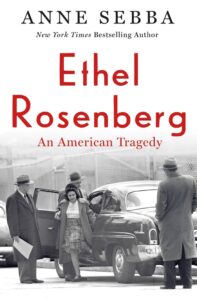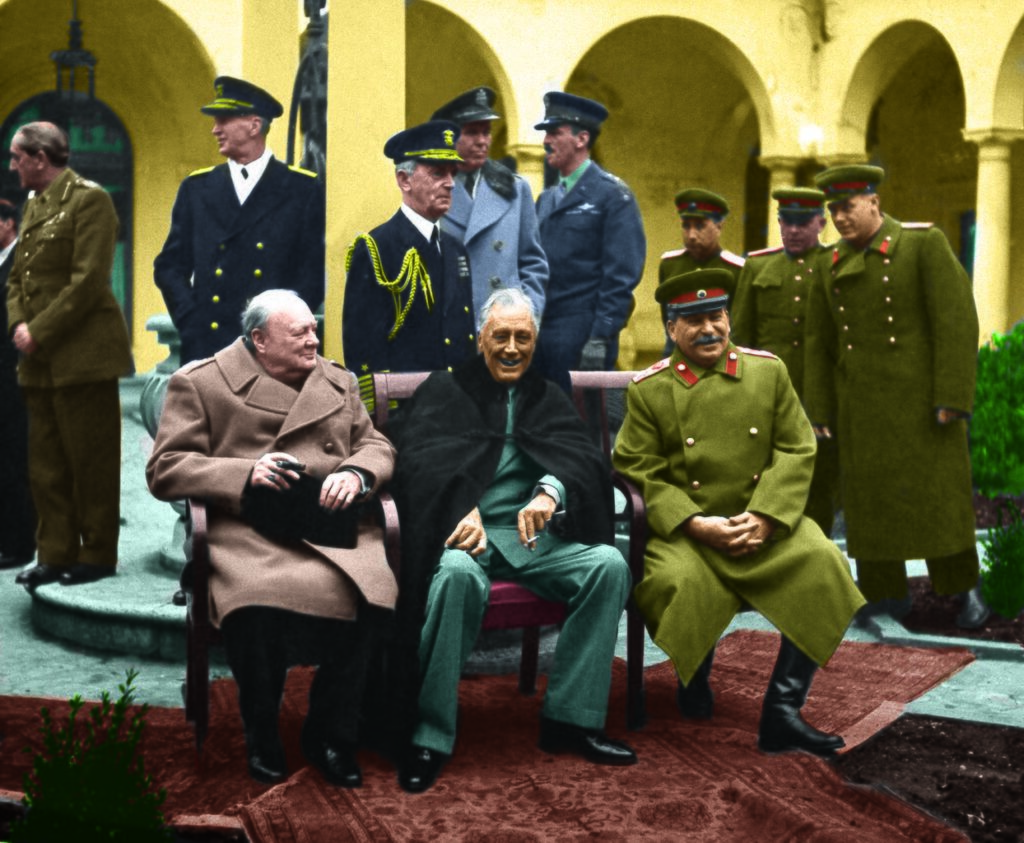
The forces that led to Ethel Rosenberg’s demise (June 19, 1953, and years before and after; New York): There’s no way to sugar coat this story. A story of new revelations that had to be told. A story of how the impossible became reality. An unbelievable story. Perhaps you won’t believe it. Frankly, that too is hard-to-believe. Ethel Rosenberg: An American Tragedy reads like historical fiction. IF only it was.
This isn’t the first time acclaimed British biographer and journalist Anne Sebba has revealed new information about a female historical figure presenting new perspectives. But it’s the first time she’s aimed her keen lens on an American woman – the only woman to be executed for a crime that wasn’t a murder.
“Ethel Rosenberg was not, I believe a spy,” Sebba convincingly argues. Rather, “hysteria” and a perfect storm of forces convicted to death a thirty-seven-year old mother of two young children – Michael was ten, Robby six, who to this day continue to defend their mother’s innocence. The evidence against Ethel was scant, dubious, and based on lies. Whereas, the evidence against Ethel’s husband, Julius Rosenberg, for passing secrets to the Soviets and recruiting a “spy ring” appears to have given the Communists a leg up on building an atomic bomb, certainly sooner than we thought.
Sebba writes about people in Ethel’s life who betrayed her, personal tragedies that turned into an American tragedy. Most glaring is her brother David Greenglass and his wife Ruth who lied to save their skins. In 2001, David admitted that he had lied. But back then a twenty-three-year-old, ambitious, tenacious lawyer named Roy Cohn (a name heard in recent years) may have been the linchpin that brought Ethel down. For instance, it was Cohn who invented the lie that David and Ruth ran with. He’d worked at the Los Alamos Lab in New Mexico where the Manhattan Project nuclear scientists invented the atomic bomb. Not bright like Ethel, he was capable of stealing vital documents, which he sent on to Julius. Sentenced to prison for fifteen years, he got out in under ten, and Ruth remained innocent.
Sebba effectively and compassionately weaves in newly released (2014) prison letters Ethel wrote to Julius at Sing Sing, notorious for using the electric chair (no longer). Still operating as a prison for violent criminals, particularly noteworthy to Ethel’s story is a museum planned to open in 2025 on Sing Sing’s grounds to address the injustices of our prison system. But there’s no way to right the injustice carried out against Ethel, except sharing new evidence and reminding us of what happened in the fifties “topsy-turvy world” when the Red Scare and McCarthyism dominated our country.
This is not a political blog, but this is an American political story. It’s also an American story of anti-Semitism and anti-immigration, and the East European immigrant story about the slum conditions and spirit of the Lower East Side in the early 20th century.
The author makes the case for Ethel’s innocence by explaining the context and circumstances that her conviction was made. Key was the timeframe the espionage was conducted, when the Soviet Union was considered our ally fighting to defeat Nazism during WWII. The Yalta Conference in 1945 in which Churchill, FDR, and Stalin met typifies that cooperation, which soon ended when FDR died and Truman became the next President and declared the Truman Doctrine to prevent the spread of Communism, a Cold War policy Sebba contends was quickly adopted by the Republicans to win back power.

Colorized photo by Grambaba [CC BY-SA 4.0] via Wikimedia Commons
The author also makes a strong point about Ethel (and Julius) sympathizing with the Communists, but so did many East European immigrants who believed socialism would improve their impoverished conditions to the tune of 40,000 Americans being members of the Community Party back then, rising to 83,000 by 1943.
You may have East European Jewish ancestors like Ethel’s (and Julius’) who immigrated to the Lower East Side in the late 20s and 30s, squeezed together in “tenement slums.” Ethel’s mother Tessie came from Galicia, now Ukraine, and her father from Poland. Jewish attitudes about Communism were furthered watching in horror Hitler’s rise to power with the Soviets aligning with Britain and the US to defeat the Nazis.
Sebba pulls together an impressive amount of research, reflected in pages and pages of Endnotes and bibliographical references, rendered with clarity, heart, and mercy. Combined with the new information she presents, you may find yourself like I was reading passages in the kitchen while cooking dinner.
“Loyalty means nothing unless it has at its heart the absolute principle of self-sacrifice.” Those were words President Woodrow Wilson spoke calling upon Americans to enter WWI. Same words quoted in the epigraph, wartime words now applied to the Cold War. Words that explain why Ethel never betrayed Julius, even if it meant leaving behind her two young sons. Michael, her first-born, was a most difficult child, which he admitted years later. Ethel is painted as a mother who gave up her aspirations and activism to become a fifties housewife when American attitudes towards childrearing were changing.
Dominated by pediatrician Dr. Benjamin Spock, and child psychologists Arnold Gesell and Bruno Bettelheim, greater permissiveness did not work with Michael. Nothing did.
Which is why Ethel may have looked like an ordinary housewife, but she was more intense, growing more obsessed about Michael’s behavior the more challenging he became, going so far as to seek psychotherapy for both of them. Her transition to dedicating herself to motherhood fits her earlier coming-of-age as she was someone who threw herself with gusto into her academics and the performing arts: theatre and singing, including at Carnegie Hall. Rather than judging her on her all-consuming mothering – therefore she couldn’t have been a spy – the prosecutors, judge, and jury (and 70% of Americans) bought into the notion that she had to be a spy or why else would a mother leave her young children behind.
Two other family betrayals contributed to Ethel’s distress. The one she took to her grave was the cruelty and absolute rejection by her mother. Her brother Sam stood with Tessie. Her brother Bernie was the only one who expressed sympathies for her, but compared to the growing protestors, especially from France, the letter he wrote to Ethel was lukewarm.
The epistolary aspect of this book is heartbreaking. Ethel’s letters to her attorney Emanuel Bloch show her increasingly feeling isolated and despairing, though she fought to remain tough on the outside to her bitter end. Her extreme attachment to her lawyer was beyond normal, though nothing’s normal in this gothic tale.
The author adds fresh authenticity by seeking out and interviewing Elizabeth Phillips in 2018. Her memories of Ethel are still vivid. She knew Ethel presumably better than most. So how could she forget?
Whatever you come to believe, you’ll agree this is a riveting story you can’t forget.
Lorraine
A great review!
Glad you enjoyed the review. Another of the author’s books on women in history is: Les Parisiennes: How the Women of Paris Lived, Loved, and Died Under Nazi Occupation (https://www.goodreads.com/book/show/28220943-les-parisiennes). It’s now on my TBR list, so I wanted to share it with you.
Great review, Lorraine. Most people don’t know that at the highest levels of the U.S. government in 1945-46, there were discussions over whether to share the A-bomb with the Soviets in the interests of a balance of power and lasting peace. Spying for another government is almost always misguided, but the impulse to help our very recent allies who lost 30 million people to WW II came close to being official U.S. policy. You touch on many key points, especially the cruelest, that Ethel was innocent and everyone knew it. Those who helped railroad her may or may not have answered to their conscience or to any higher power, but they have answered to history, for whatever that’s worth.
Appreciate your adding your insight, Barton. Yesterday, the conservative National Review tore apart Sebba’s book, though they did acknowledge she’s a respected historian! History keeps repeating itself, twisting truths and telling lies. Ethel, it seems, which your comments validate, believed Julius was not a traitor to his country. You can’t help but wonder had she believed otherwise, what she would have done given her dedication to her children? I had the sense that she would have sacrificed herself anyway, leaving her complex personality more complicated. Perhaps having been betrayed by so many in her family, she felt loyalty was upmost?